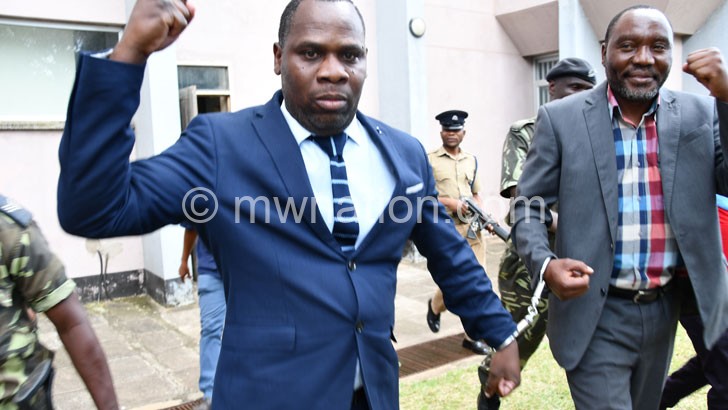Activists celebrate electoral justice
It’s a sunny Saturday morning in Blantyre City ahead of the announcement of the dramatic fall of Peter Mutharika’s regime.
Campaigners opposed to rampant corruption, nepotism and impunity are hiding in a high-density location away from hotels occupied by their “ruthless political foes”.
Here, leaders of Human Rights Defenders Coalition (HRDC) Gift Trapence, Luke Tembo and McDonald Sembereka are constantly on call, receiving congratulations for sacrificing their lives for electoral justice as well as requests to sign statements endorsing former opposition leader Lazarus Chakwera’s win with 58.7 percent of the vote and have photographs with them.
Empty bottles in their secret lodging show these ‘celebrities’—unsung heroes—have been partying to the ending of the historic re-run following the annulment of Mutharika’s re-election in May 2019.

The loser laments “the worst-ever election” in Malawi, but the watchdogs say the retake is miles better than his “tippexed victory”.
“It’s God-given. It’s amazing. It’s very humbling. It’s confusing. We can’t comprehend the change happening today. We are asking ourselves: Is it true that we have the change Malawians have been awaiting for a long time?” says Trapence.
The HRDC marshalled ceaseless protests against the May 21 2019 presidential election, which the five-judge panel of the High Court sitting as the Constitutional Court later nullified on account of massive irregularities.
The activists are bubbling with joy at the crushing triumph of Chakwera and his ally Saulos Chilima who marched shoulder-to-shoulder with them in the protests.
They rejected ceasefire negotiations initiated by former president Bakili Muluzi, marching on until the courts trashed the poll stubbornly defended by Malawi Electoral Commission (MEC) under former chairperson Justice Jane Ansah.
Muluzi became a trusted voice for smooth succession when Bingu wa Mutharika died in office in 2012 and Joyce Banda lost the presidency to Bingu’s brother six years ago. However, the watchdogs declined to secretly meet him as his son Atupele was a minister under Mutharika. Atupele was later picked as Mutharika’s running mate in the court-ordered June 23 poll.
“He was going to finish us and the people’s cause,” says Trapence. “It was in black and white that the election had been mismanaged. The Tippex and evidence of mismanagement was there for all to see. We couldn’t let impunity to go on.”
The movement surmounted detentions without trial, death threats, petrol-bombings, character assassination, beatings, hidings and a law to close civil society space as Mutharika vowed “to meet force with force” and crush his critics “like a tonne of bricks”.
At home, their families were concerned about their safety and jobs as attacks from pro-regime vigilantes intensified.
The father-of-three states: “It wasn’t easy to go on the streets. We were receiving death threats daily. Every demonstration was met with resistance. We faced an arrogant regime and a MEC chairperson who refused to resign.
“Our wives were sacked from their jobs by State institutions. Mine was fired at Escom just as comrade Timothy Mtambo’s [spouse] lost her job at Malawi Revenue Authority. They did everything to bring us to our knees.”
A month into the sustained spate of protests Ansah mistook for mob justice, Trapence and Sembereka were arrested ahead of their thwarted “one-million march” to close Kamuzu Palace, which he considers the turning point “as crowds kept growing”.
A month after five judges in the Constitutional Court nullified Mutharika’s messy victory on February 3, the two were re-arrested alongside their fearless leader Timothy Mtambo who emerged from confinement to start a political movement to “remove the evil regime”.
Mutharika accused them of conspiring with opposition leaders to oust him just as he blamed the courts for “a judicial coup” when the Malawi Supreme Court of Appeal affirmed the annulment of his “undue election” ruined by “widespread and systematic irregularities”.
The activists hail the independent judges for upholding people’s will though the outbound head of State branded them “a criminal society” and “terrorists”. The courts also defended the constitutional right to demonstrate freely and peacefully as Mutharika and his backers tried to stop them.
The soldiers also protected citizens from governing party ‘youth cadets’ who ruthlessly attacked them and hacked Billy Mayaya last September.
Trapence asks: “If we were terrorists, why didn’t they arrest us? Why was the army protecting us?
“To us, terrorists are those who terrorised Malawians for six years; those who were stealing taxpayers’ funds; those who did not give justice to women raped by the police in Msundwe; those who didn’t investigate the killing of Mr. and Mrs. Tambala in Lilongwe and those who killed Anti-Corruption Bureau employee Issa Njaunju.”
Chakwera pledges “a win for all Malawians” he touted as his bosses shortly after MEC chief Justice Chifundo Kachale delivered what lawyer Khumbo Bonzoe Soko terms “a nimmaculate election” within 20 days. However, HRDC wants outstanding high-level crimes punished, unfinished cases concluded, corruption eliminated and public service cleansed.
They warn that the honeymoon may be over within 100 days if “the end of an error” prolongs impunity and nepotism.
Trapence states: “Malawians want people-centred leaders. From Nsanje to Chitipa, we are all one. If you walk with the people, they will always celebrate you. But if you are selfish, history can repeat itself. People who put you in power can remove you no matter how powerful you become.”
He says the civil society across Africa should be independent and “stand on the side of voiceless people” to survive jaws of regime changes they back.
“HRDC is a people’s movement, so we will always stand with people,” he says, certain that it will outlive those coveting political jobs.
And he adds: “The big issue is: If you join politics, are you serving the people? So, the question should be this: Whatever you are doing, whether its business or public service, are you serving the people rightly? When I leave HRDC, am I going to serve people patriotically?”





